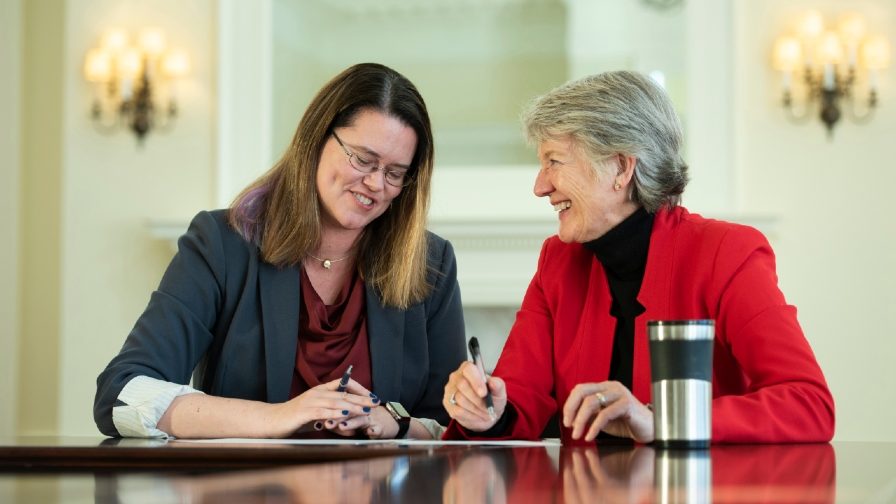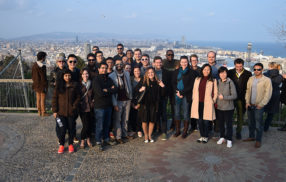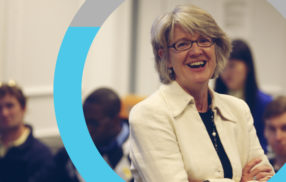
How an Innovation Mindset Breaks Mammoth Societal Problems Down to Human Scale
By Melissa Castro
Years ago, when University of Virginia Darden School of Business Professor Jeanne Liedtka taught an iteration of a design-thinking elective involving problem-solving partnerships with major corporations, it could be difficult to get students to sign up to work with the more socially minded ventures. Maybe the problems were too complex, or perhaps lacked the cachet of working with a top finance or consumer products company.
Whatever the reason, that’s no longer the case. Times have changed.
Now, Liedtka said, students want to work on the United Nations Population Fund or help police departments improve their traffic stops.
“I think students feel a sense of responsibility to be a part of solving big problems,” Liedtka said.
And they are leaving Darden equipped to solve those problems, which means the School and its alumni are now out in the world using tools like a design-thinking mindset as a global force for social good.
Working With the UN and (Potentially) a Small Army of Design Thinkers
Liedtka has seen the reach of Darden ideas around innovation and design thinking expand dramatically during her time as a professor, as alumni seed ideas into the world and global organizations reach out to Darden.
Recently, Liedtka engaged with the government of Singapore, which has set explicit goals to train thousands of government workers in design thinking to help “meet the evolving demands of the future economy” through its Skills Framework for Design program.
Closer to Grounds, Liedtka has facilitated a yearslong collaboration with the United Nations, a relationship that began after a senior learning and development officer took one of Liedtka’s design-thinking courses on Coursera (NASA got in touch after a similar introduction via online learning).
The digital encounter led to Liedtka working with different leadership teams at the U.N., and in recent years the organization has been one of the sponsors of class projects in which students work with companies to solve specific real-world issues.
Recently, the project’s sponsors at the U.N. asked Liedtka if they could work with additional students to help prototype and experiment with some of the solutions a previous class devised for the U.N. Population Fund, which focuses on the health of pregnant women worldwide.
“It’s very exciting when you can see that impact and enthusiasm for the work of Darden students, the power of people learning design thinking and their ability to create real value for organizations dealing with these kinds of challenging, complex issues,” said Liedtka.
The expanding work with the U.N. comes against a backdrop of students with growing interest in working on major problems with societal impact, Liedtka said. Previously, students prioritized working on problems with marquee corporations. Now, the U.N. is the most requested project, Liedtka said. In the previous year, a project working with a local police department to devise more positive traffic-stop experiences was the most highly sought.
Innovation: The Common Thread in Solving Wicked Problems
In March 2001, Rachel Brozenske (MBA ’01), then a Second Year student at the Darden School, stood in the still-unfinished nave of Antoni Gaudi’s La Sagrada Familia basilica in Barcelona, Spain. Amid the two-story stained glass windows and the soaring columns, her Darden classmates considered the connections between art and architecture and business strategy and innovation.
Brozenske had come to Darden after a career in graphic design and production and enrolled in Liedtka’s “Strategy as Design in Barcelona” course, which to this day examines the confluence between business strategy and design.
The study in Barcelona convinced Brozenske, then Rachel Korkowski, that she could use her confluence of skills to help solve intractable business and public-sector problems by first focusing on the human aspects of design problems, and then translating the design challenges and proposed solutions to the stakeholders involved.
Today, as vice president at Charlottesville-based Allison Partners, Brozenske helps clients, including large corporate clients and local governments, facilitate productive solutions to a host of issues.
Brozenske, a longtime Darden visiting lecturer, is also putting her expertise into play in a new Executive MBA course, “Wicked Problems,” in which students work in small groups to consider seemingly intractable global problems — issues related to water, transportation and education, for instance — from an innovation mindset. No one expects that a team will solve the global water crisis in the span of a few months, but by considering such a major societal problem with new tools, students are primed for innovative thinking and action for a host of issues within their grasp.
The Opioid Crisis, Incarceration Rates and More Case Studies of the Innovation Mindset in Practice
Across the river from the Executive MBA home at UVA Darden DC Metro, at least two Washington, D.C., area firms with Darden connections are also tackling public-sector problems using the set of tools Liedtka has woven into the fabric of a Darden education.
Natalie Foley (MBA ’11) is CEO of Peer Insight, a firm founded in 2004 by Tim Ogilvie, a UVA alumnus and Darden lecturer who co-wrote the book Designing for Growth on design thinking with Liedtka. Peer Insight helps established organizations across all sectors design, test and launch new products and services “in months, not years,” according to Foley.
Foley and her team at Peer Insight have used their design thinking and entrepreneurship tools in each sector to tackle social impact challenges. They helped the National Institutes of Health better frame and tackle the obstacles to finding a cure for sickle cell anemia, for instance. Peer Insight also supports nonprofits tackling social issues, helping AARP create new services around senior fraud prevention and caregiving and Memorial Sloan Kettering Cancer Center create ways to combat burnout on their cancer care team. In the private sector, they have helped firms be a part of what Foley termed “the social solution,” helping Kimberly-Clark create services related to public health and Nike create a new service built around a sustainability principle.
In 2017, Foley helped Peer Insight launch PX, a venture studio that allows firms like these to create a space for disruptive ideas inside big organizations to be tested and accelerated if the design-thinking driven testing shows a viable proof of concept.
Similarly, Molly Hill Patten (MBA ’01), a classmate of Brozenske’s, is COO at ideas42, a nonprofit that partners with governments, NGOs and organizations across the world to tackle problems ranging from the opioid crisis in Boston to over-incarceration in New York City to crop loss in Tanzania.
Among dozens of projects, ideas42, which uses behavioral science often supported by design thinking, redesigned New York City’s summons process so that low-level offenders — say, people who ran a red light — would be less likely to wind up in jail for failing to pay their fines or show up in court, Patten said.
Patten said the solution emerged through empathy for all types of people who might receive a summons.
A harried, low-income New Yorker working multiple jobs may not have the time or literacy skills to understand and deal with a minor traffic ticket. A redesigned summons that highlighted the consequences for failing to appear dropped no-show rates by 13 percent. And offenders who received text message reminders were 36 percent more likely to follow through and stay out of jail.
By considering the humans at the heart of the problem, the organization helped save the city money and improve the lives of countless New Yorkers.
Want to Innovate? Start With Empathy
The common thread in solving any of these wicked problems, according to practitioners — whether in a corporate or civic setting — is starting with empathy and studying the context in which problematic behaviors occur.
Looking at problems through an empathetic lens, Brozenske said, we need to consider what makes it hard for a person to do the right thing, and what would make it easier.
In addition, “context matters,” Patten said, discussing ideas42’s partnership with Massachusetts General Hospital to alleviate opioid dependency among its patients. “These emergency rooms doctors want to help patients, but this is all about triage and throughput — the next person in line is bleeding.”
That context helped explain why so few ER doctors were prescribing buprenorphine to treat opioid-addicted ER patients, Patten said.
Once a problem is truly understood, action-oriented Darden graduates trained in innovative thinking are able to go beyond the problem-solving processes that are typical to most conference rooms.
“In a business context, we usually identify the problem and start implementing the first practical solution. But in this design approach, we push further and look at as many really novel ideas as possible,” Brozenske said. “Most of us are not good at presenting a crazy, wonky idea and inviting others to pick it apart and make it better. But that’s largely what it takes when it comes to solving these intractable things.”
The University of Virginia Darden School of Business prepares responsible global leaders through unparalleled transformational learning experiences. Darden’s graduate degree programs (MBA, MSBA and Ph.D.) and Executive Education & Lifelong Learning programs offered by the Darden School Foundation set the stage for a lifetime of career advancement and impact. Darden’s top-ranked faculty, renowned for teaching excellence, inspires and shapes modern business leadership worldwide through research, thought leadership and business publishing. Darden has Grounds in Charlottesville, Virginia, and the Washington, D.C., area and a global community that includes 18,000 alumni in 90 countries. Darden was established in 1955 at the University of Virginia, a top public university founded by Thomas Jefferson in 1819 in Charlottesville, Virginia.
Press Contact
Molly Mitchell
Senior Associate Director, Editorial and Media Relations
Darden School of Business
University of Virginia
MitchellM@darden.virginia.edu







